The Adult Training Scheme
The Adult Training Scheme
Overview
All adults taking on an appointment in Scouting are required to show that they have the skills needed for the role. The details of the training requirements for different appointments in The Scouts are defined further on in this chapter.
To help individuals through the process of completing this training they will be linked with one or more Training Advisers. Training Advisers are responsible for helping adults match their existing skills with those of their new role, for identifying skills gaps, for agreeing plans for gaining the required skills and for confirming that those skills have been successfully gained.
The appointment process
Once an adult has been recruited, they will go through the appointment process to ensure that they are suitable for the role. Once the relevant checks have been made the adult will be issued with a provisional appointment. Once this has been issued, the adult will have five months in which to complete their Getting Started training.
Getting Started
Getting Started is made up of six modules which must be completed before the adult can be fully appointed. There is a seventh module for trustees.
Getting Started needs to be completed within five months of the role start date, as recorded on Compass. These modules are:
- Personal Learning Plan (02)
- Essential Information (01)
- Safety
- Safeguarding
- Tools for the Role: Section Leaders (03) or Tools for the Role: Managers and Supporters (04)
- General Data Protection Regulations (GDPR)
- Trustee Introduction (for trustees)
These modules may be completed in any order. In order to ensure that adults can complete Getting Started within the required timescale (five months) the modules are available as online learning.
Once a learner has completed Getting Started they may wear the Gilwell woggle. Non-uniformed adults may wear the Getting Started pin. Both are available to purchase from Scout Stores.
If an adult’s provisional appointment expires and they have not completed Getting Started, then the adult’s line manager will be informed (through a locally defined route). The line manager will then review the situation with the learner to find out why they have not completed this stage. Mutually agreed restrictions must be put in place by Commissioners to support learners to complete their training. Find out more about mutually agreed restrictions.
This module consists of creating a plan to meet the training requirements of the role, taking into account existing knowledge and skills. This must be completed within five months of gaining the provisional appointment and reviewed at least every six months up until completion of the Wood Badge.
The adult should discuss and agree their Personal Learning Plan with their Training Adviser. The discussion should involve:
- Agreeing which modules the learner needs to complete
- Identifying whether the learner needs to do any learning to be able to complete each module; if they do, agree which method they will use
- Identifying whether the learner has any prior learning that they can apply to their Scouting role
- Determining whether the learner wishes to work towards the external award option
- Identifying the validation methods for the first modules
- Agreeing a timescale for all the above
In a single meeting they should not aim to agree a learning method, validation and timescale for every module. They should try to prioritise the modules and create a plan for those that the learner is going to work on in the next six to twelve months. It may be that at the first meeting they just agree the learning and validation methods for the Getting Started modules, which need to be completed within the first five months.
County Training Managers should ensure that all Personal Learning Plans in the County are collated in order to help them plan a learning provision for their County. Knowing how many people require training for a particular module, and what their preferred learning method for that module is, will enable the County Training Manager to provide appropriate opportunities for learners.
The Training Adviser’s Guide contains help and advice on creating Personal Learning Plans, whilst the Adult’s Personal File contains a workbook which the learner can use either by themselves or alongside their Training Adviser to assist with the process of putting together their Personal Learning Plan.
This module provides the basic information that all adults in Scouting need to know. It covers the movement’s history, the Fundamentals of Scouting, key policies, the structure of The Scouts and support available to adults in Scouting.
It is important that the learner receives this training as early as possible. The module has been redesigned as online independent learning which includes built-in assessment and the generation of a certificate that can be used for validation.
Take a look at our online learning.
This module provides the information that all adults in Scouting need to know to keep young people and adults safe. It covers the Safety Policy, how to assess and manage risk, role of leader in charge, emergency, incident and near miss procedures and how to access safety resources and guidance for the safe management of activities.
It is important that the learner receives this training as early as possible. The module has been redesigned as online independent learning which includes built-in assessment and the generation of a certificate that can be used for validation to ensure that learners can access the module as easily as possible.
This training needs to be renewed every three years.
Take a look at our online learning.
This module provides the information that all adults in Scouting need to know to keep young people and adults safe. It covers the Safeguarding Policy, the Young People First Safeguarding Card Code of Conduct (Yellow Card), how to recognise abuse, concerns and how to make Scouts safe.
It is important that the learner receives this training as early as possible. The module has been redesigned as online independent learning which includes built-in assessment and the generation of a certificate that can be used for validation.
This training needs to be renewed every three years.
Take a look at our online learning.
This module provides Trustees with information on their legal responsibilities and current regulations. It covers the Trustee Board and trusteeship in Scouts, key policies and the roles and responsibilities of being a trustee in Scouts.
This module is only required of those who are Trustees. This includes those who are ex-officio trustees – Group Scout Leaders, District and County Commissioners for example.
It is also required by Section Leaders who opt into a Trustee role.
It is important that the learner receives this training as early as possible. The module has been designed as online independent learning which includes built-in assessment and the generation of a certificate that can be used for validation.
Take a look at our online learning.
There are two Tools for the Role modules. The learner completes either the version for Section Leaders or for Managers and Supporters, depending on their role.
Tools for the Role: Section Leaders (03)
This contains some basic information about the role, key features of the section, how to deliver suitable activities and how to promote positive behaviour.
Tools for the Role: Managers and Supporters (04)
The module covers the basic information about the role, roles and responsibilities of those managed and/or supported by the learners. It also covers areas of leadership and management, managing time and personal skills.
This covers the basic information that individual’s need to know in relation to the General Data Protection Regulations, what this means for their role and for Scouting and how to effectively align with it.
Topics covered:
- Personal Data
- Individuals' rights
- Consent
- Accountability & Governance
Wood Badge
Once a learner has completed Getting Started, they will move on to completing all the training relevant to their role. For some roles a Wood Badge will need to be completed.
The Wood Badge is the internationally recognised Scouting training insignia awarded to adults by Headquarters to denote completion of the training required for their role. The Wood Badge consists of two wooden beads threaded onto a leather thong which is worn with Scout uniform.
In the UK, Scouting training is tailored to an adult’s appointment, and therefore not all appointments are required to work towards a Wood Badge. There are a number of different routes to achieving the Wood Badge, based on an adult’s appointment, and these are outlined in more detail later in this resource. An adult is required to complete their Wood Badge within three years of their full appointment.
Once the learner has validated all the modules necessary for their role and has agreed the ongoing learning that they will complete in the next year, the recommendation for award of the Wood Badge can be made. The stages in the Wood Badge process and who is responsible for them are shown in Table 1 below.
If a learner has not completed their Wood Badge within three years of the role start date as recorded on Compass, the appointment may be cancelled by the relevant Commissioner, acting together with the Appointments Advisory Committee. Mutually agreed restrictions must be put in place by Commissioners to support learners to complete their training. Read more about mutually agreed restrictions.
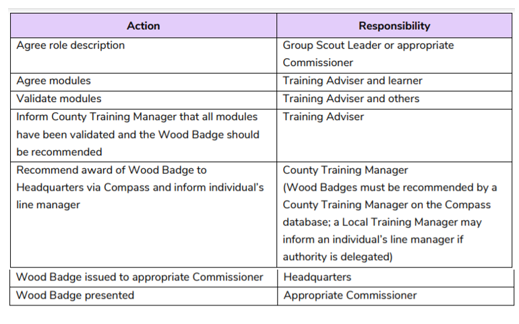
In most cases the County Training Manager is responsible for recommending the award of the Wood Badge. Table 2 below shows who is responsible for recommending Wood Badges for different appointments.
Headquarters is responsible for awarding Wood Badges and will forward the Wood Badge and certificate to the appropriate Commissioner for presentation. Since the introduction of the Membership database, Compass, Wood Badges must be recommended to Headquarters by a County Training Manager on the Compass database.
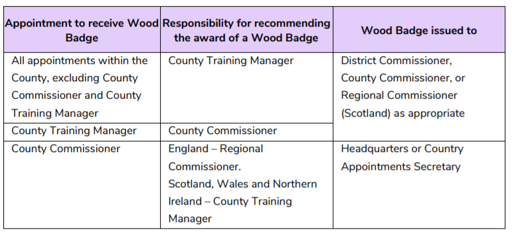
The Module Matrix
The Module Matrix provides a summary of all the learning that makes up the Adult Training Scheme. The Matrix has five sections:
- Getting Started training
- Training for All Appointments
- Section Leaders and Section Supporters training including sections of learning on ‘The Programme’ and ‘The People’
- Manager and Supporter training
- Supplementary modules
The Module Matrix is colour coded to give you an indication of the roles which are likely to benefit from the training. The Matrix also provides delivery methods and a guide to each module's content. The Matrix is only a summary of the scheme and you should refer to the Minimum Module Requirements section for more information on the training requirements for specific roles.
Click to view the full Module Matrix.
You are encouraged to look at other modules within the scheme that may be relevant to your role but do not make up the minimum requirements for your appointment. These modules may be completed in addition to the minimum requirements, or as Ongoing learning. For ease of reference, the modules are referred to in colour groups relating to the Module Matrix.
For appointments in Groups 1 and 2 a defined Wood Badge route is not available. However, you may, if you choose to, create a Wood Badge route in agreement with your County Training Manager. If you do this, it's important to make sure that all the modules can be validated within your current role in Scouting.
A Wood Badge route is not available for these appointments but Essential Information (01), Safety, Safeguarding and GDPR must be completed. Trustee Introduction must also be completed for those who are Trustees.
- Administrator
- Adviser
- Chair
- Communications Manager
- District Explorer Scout Administrator
- Trustees (Group, District or County)
- Manager of the Activity Permit Scheme
- Queen’s Scout Award Co-ordinator
- Scout Network Administrator
- Secretary
- Skills Instructor
- Treasurer
- Vice Chair
- Supporter of the Nights Away Permit Scheme
A Wood Badge route is not available for these appointments but Essential Information (01), Safety, Safeguarding and GDPR must be completed together with the additional module(s) stated:
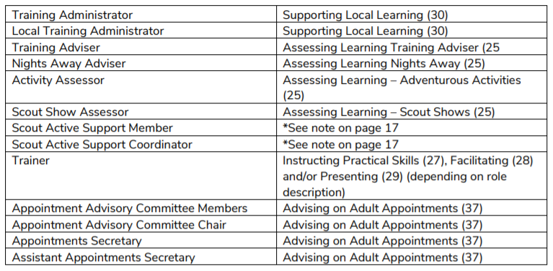
A Wood Badge is available for these appointments but is not obligatory. However, Essential information (01), Safety, Safeguarding, GDPR and Tools for the Role (Section Leaders) (03) must be completed.
- Section Assistant
A Wood Badge is obligatory for these appointments and requires all green and grey modules on the Module Matrix to be completed:
- Beaver Scout Leader
- Assistant Beaver Scout Leader
- Cub Scout Leader
- Assistant Cub Scout Leader
- Scout Leader
- Assistant Scout Leader
- Explorer Scout Leader
- Assistant Explorer Scout Leader
- Explorer Scout Leader (Young Leader)
- County Leader
- District Leader
- County Leader (Section)
- District Leader (Section)
A Wood Badge is obligatory for these appointments and all green, blue and red sections on the Module Matrix. For some appointments, there are supplementary modules which must also be completed as stated below:
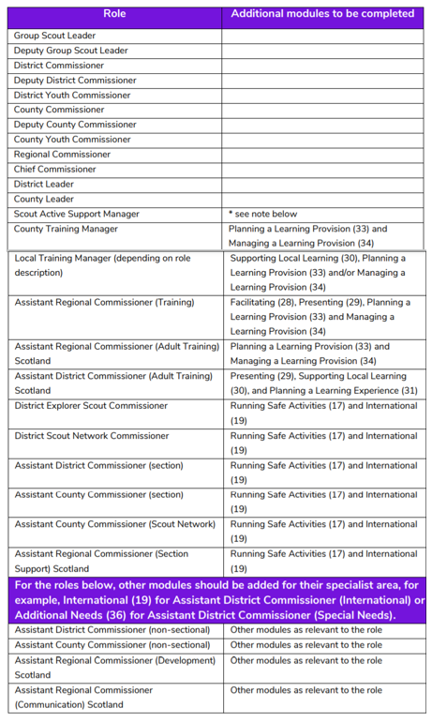
Click to see the image in full screen.
Those holding roles within a Scout Active Support Unit, including Scout Active Support Member, Scout Active Support Co-ordinator and Scout Active Support Manager should complete, as well as the training indicated above, those modules of the training scheme which are relevant to the nature of their role in the Unit which they belong to. This could include Module 3: Tools for the Role, Module 12a: Delivering a Quality Programme, Module 17: Running Safe Activities, or any other relevant module(s). The service agreement for a Scout Active Support Unit will outline the support provided by the Unit and will help to determine which training will be relevant for its members.
Change of role
It's not unusual for an adult to change roles in Scouting. If they have completed their training under the current Adult Training Scheme, they may need to revalidate some elements to ensure that they have the correct skills and knowledge for their new role. Other elements will not need to be revalidated.
In some cases, the need to re-validate will depend on which role you are moving from and to. Roles are split into three categories:
- Section Leader (anyone working in a section).
- Manager (Group Scout Leader, District Commissioner, County Commissioner, County Training Manager, District Explorer Scout Commissioner etc).
- Supporter (Assistant District/ County Commissioner).
The following table shows the modules of the training scheme and indicates with a tick, training
which you will need to validate again, and a cross for modules that you don't. This is also indicated
on the information about each module in the Adult’s Personal File and the Training Advisers Guide.
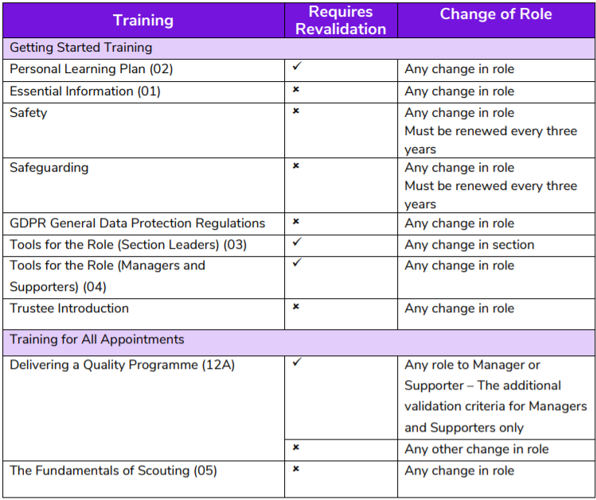
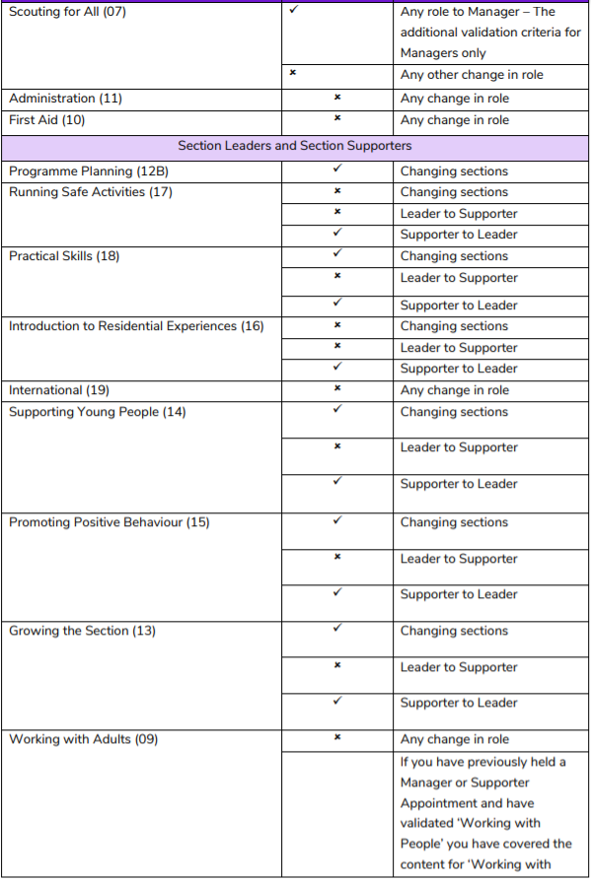
Ongoing Learning
All adults holding appointments for which a Wood Badge is required must participate in an average of at least five hours ongoing learning each year. This is to ensure they continue to acquire new skills and keep up to date with new trends and policies. Ongoing learning must be at least five hours per year, calculated over the length of the appointment. Therefore, if an adult went on a week-long residential course, for example, this could be counted as the ongoing learning for the whole period of the appointment.
Ongoing Learning Hours
The learner must agree their plan for the first year of ongoing learning with their Training Adviser before the recommendation for the Wood Badge can be made. After this it is the responsibility of the learner’s line manager to monitor ongoing learning. As part of the normal review process the Appointments Advisory Committee and the learner’s line manager have responsibility for ensuring that the adult has completed the required Ongoing learning at the time when the appointment is reviewed.
Ongoing learning can be any number of things. In essence any training, learning or development completed by the adult that they can then use in their Scouting role is appropriate to count as ongoing learning. Occasionally, Headquarters may specify ongoing learning topics for some or all appointments. This is only likely to occur in the case of major policy or legal changes. In these cases, Headquarters will make training material and support documentation available.
Examples of Ongoing learning could include:
- The maintenance of a current adult first aid qualification/first response certificate
- A Scout Leader taking a web design course and then creating and maintaining a Group website
- An Assistant Beaver Scout Leader gaining a basic food hygiene certificate before catering for a Beaver Scout sleepover
- A District Commissioner attending a County recruitment workshop
- An adult attending some form of cultural or additional needs awareness training
- An Assistant Cub Scout Leader planning their first camp alongside a more experienced leader
- Any of the supplementary modules, for example Facilitating (28) or Presenting (29)
Mandatory Ongoing Learning
Although the ongoing learning hours a learner is required to complete each year can be any number of things, there are also some specific ongoing learning requirements which members must complete. Any member who holds an appointment for which Safety and Safeguarding training is completed as part of Getting Started is required to keep it up to date. This training must be renewed every three years.
Members are required to complete the approved Scouting specific safeguarding training at least every three years. This module provides the information that all adults in Scouting need to know to keep young people and adults safe. It covers the Safeguarding Policy, the Young People First Safeguarding Card Code of Practice (Yellow Card), how to recognise abuse, concerns and how to make Scouts safe.
Members are required to complete Scouting specific safety training at least every three years. This module provides the information that all adults in Scouting need to know to keep young people and adults safe. It covers the Safety Policy, how to assess and manage risk, role of leader in charge, emergency, incident and near miss procedures and how to access safety resources and guidance for the safe management of activities.
All adults in Scouting holding a Leader, Manager or Supporter appointment are also required to hold a current First Aid certificate. While everyone should always maintain their qualification, the First Aid certificate must be valid at the issue of the Wood Badge and for appointment renewal. This should be monitored by their line manager at the point of appointment review, at least every three years. The minimum standard for First Aid Training within The Scouts is First Response. This will fulfil the requirements for appointment renewal.